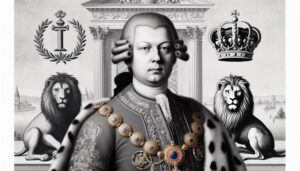Meaning of the Name Regan
The name Regan originates from the Irish surname Ó Riagáin, meaning 'descendant of Riagán.' In Gaelic, it translates to 'little king' or 'royal descendant,' highlighting its noble and regal connotations. Historically, the name is tied to Irish kings and chieftains, particularly in Leinster during the 9th century, signifying power and leadership.
In literature, Regan is a character in Shakespeare's "King Lear," embodying ambition and ruthlessness. The name has seen varying popularity, with notable revivals in the late 20th century.
To explore its rich historical roots and continued relevance, one could investigate further.

Key Takeaways
- Regan means 'little king' or 'royal descendant' in Gaelic, denoting nobility and lineage.
- The name originates from the Irish surname Ó Riagáin, meaning 'descendant of Riagán.'
- Regan is historically significant, linked to Irish kings and chieftains in the 9th century.
- In literature, Regan is a character in Shakespeare's 'King Lear,' symbolizing ambition and ruthlessness.
- The name is gender-neutral, with phonetic simplicity and adaptability, contributing to its modern popularity.
Origin of the Name
The name Regan is rooted in Irish and Gaelic origins, deriving from the surname Ó Riagáin, which means 'descendant of Riagán.' This surname, historically significant, emerged within the ancient Gaelic clans of Ireland.
The prefix 'Ó' indicates lineage, signifying 'grandson' or 'descendant.' The name Riagán itself is formed from 'rí,' meaning 'king,' and a diminutive suffix, indicating a royal lineage.
Tracing back to medieval Ireland, the Ó Riagáin clans were mainly located in the provinces of Leinster and Connacht. The anglicization of Ó Riagáin to Regan represents a common practice during periods of English influence in Ireland, simplifying Gaelic names for easier pronunciation and integration.
Therefore, the name Regan holds deep historical and cultural significance.
Gaelic Meaning
Rooted in the Gaelic language, the name Regan carries the meaning of 'little king' or 'royal descendant.' This etymological foundation stems from the Gaelic term 'Rí,' which translates to 'king,' combined with a diminutive suffix that implies endearment or youth.
The name reflects a historical emphasis on lineage and nobility, often reserved for those of perceived importance within Gaelic-speaking communities. The appellation signifies not just royalty but also a sense of familial pride and continuity.
Historical Significance
Throughout history, the name Regan has been associated with figures of nobility and leadership, reflecting its Gaelic origins and cultural significance.
Originating from the Irish surname 'Ó Riagáin,' which means 'descendant of Riagán,' the name has connections to ancient Irish kings and chieftains. Riagán, derived from 'rí,' meaning 'king,' underscores the name's regal connotations.
In the 9th century, the Uí Riagáin clan held significant power in the Kingdom of Leinster, an influential region in early medieval Ireland.
The name Regan evokes a sense of historical prominence and authority, capturing a legacy of leadership that has resonated through the ages.
This enduring association illustrates the deep cultural roots and historical importance of the name.
Regan in Literature
Among the most notable literary references to the name Regan is its appearance in William Shakespeare's tragedy 'King Lear,' where Regan is one of King Lear's daughters. Regan is depicted as manipulative and power-hungry, which contrasts starkly with her sister Cordelia's virtue. This portrayal has indelibly linked the name with themes of ambition and ruthlessness in literature.
| Aspect | Description |
|---|---|
| Literary Work | King Lear |
| Author | William Shakespeare |
| Character Traits | Manipulative, Ambitious, Ruthless |
| Contrast | Opposite of Cordelia's Virtue |
Shakespeare's characterization of Regan has influenced subsequent literary works, embedding the name in the cultural lexicon as a symbol of cunning and moral complexity. This historical depiction continues to resonate in modern interpretations and adaptations.
Popularity Over Time
The popularity of the name Regan has fluctuated over the centuries, influenced by cultural shifts and historical events.
In the early medieval period, Regan was a relatively obscure name, lacking widespread usage.
The name saw a resurgence in the 16th and 17th centuries, largely attributed to its appearance in Shakespeare's 'King Lear,' where one of the daughters bears the name.
However, the 19th and early 20th centuries saw a decline in its popularity, with other names overshadowing it.
The latter half of the 20th century witnessed another revival, particularly in English-speaking countries, possibly influenced by prominent figures bearing the name.
This trend has continued into the 21st century, reflecting a broader acceptance of unique and historically rich names.
Cultural Variations
Regan, as a given name, exhibits notable cultural variations, reflecting diverse linguistic and regional influences. In its Irish origin, Regan is derived from the Gaelic 'Ríagán,' meaning 'little king' or 'impulsive.' This connotation is deeply rooted in Ireland's historical context, where names often signified social status or characteristics.
In English-speaking regions, particularly influenced by Shakespearean literature, Regan gained recognition as a character in 'King Lear,' symbolizing ambition and complexity.
In contrast, in the United States, the name has seen a gender-neutral evolution, used for both males and females.
The multifaceted nature of the name Regan highlights its adaptive qualities across different cultures, embodying varied historical and social narratives that continue to shape its contemporary usage.
Famous People Named Regan
The name Regan has been borne by various notable figures throughout history, covering both historical and contemporary contexts.
From influential historical figures who have shaped political landscapes to modern celebrities in entertainment and sports, the name carries a legacy of impact and recognition.
Understanding these individuals' contributions provides a thorough perspective on the name's significance and enduring relevance.
Historical Figures Named Regan
Among historical figures named Regan, one notable example is Regan MacNeil, the fictional character from William Peter Blatty's 1971 novel 'The Exorcist.'
Though fictional, Regan MacNeil has left a significant cultural impact, representing the struggle between innocence and malevolent forces. She symbolizes the broader themes of possession and exorcism, which have historical and religious connotations.
In literature, characters like Regan often serve as vehicles for exploring human fears and societal issues. Despite being a creation of fiction, Regan MacNeil's character has influenced the portrayal of exorcism in popular culture, making her a pivotal figure in the genre of horror.
Therefore, she represents a unique intersection of fiction and cultural history associated with the name Regan.
Modern Celebrities Named Regan
Moving from historical and fictional figures to contemporary individuals, the name Regan has also been carried by several modern celebrities who have made their mark in various fields. Among them is Regan Smith, an accomplished American swimmer who has set world records and earned numerous accolades on the international stage.
Additionally, Regan Burns, a noted actor and comedian, has appeared in various television shows and commercials, contributing notably to the entertainment industry.
Another prominent figure is Regan Hillyer, an influential entrepreneur and author known for her motivational speaking and personal development programs. These modern bearers of the name Regan highlight its versatility and enduring appeal, spanning across diverse professional domains and showcasing the multifaceted success associated with it.
Modern Usage
In contemporary society, the name Regan has experienced a resurgence in popularity, particularly in English-speaking countries. Historically rooted in both Irish and Shakespearean origins, it has transcended its traditional confines to become a unisex name.
This trend aligns with modern preferences for names that defy gender norms. Data from recent years indicates a steady increase in the name's usage, especially among newborns in the United States and the United Kingdom. The rise can be attributed to its phonetic appeal and cultural versatility.
Additionally, the influence of media and notable personalities bearing the name has contributed to its growing acceptance. Therefore, Regan's modern usage reflects broader societal shifts toward inclusivity and historical appreciation.
Name Characteristics
The name Regan is characterized by its rich historical roots, phonetic simplicity, and adaptable nature. Historically, the name traces back to Irish and Gaelic origins, often linked to royalty and nobility.
Phonetically, Regan is straightforward, featuring a two-syllable structure that is easy to pronounce and remember. Its simplicity does not diminish its strength; rather, it enhances its versatility across different cultures and languages.
Additionally, the name's gender-neutral quality makes it suitable for both males and females, further broadening its appeal. In literature, especially in Shakespeare's *King Lear*, Regan is a prominent character, adding a layer of literary significance.
Conclusion
The name Regan, rooted in Gaelic origins, juxtaposes its historical significance with literary prominence. Its evolution through time highlights fluctuating popularity, while cultural variations demonstrate its adaptability.
Notable individuals named Regan contribute to its modern relevance, merging the past with the present. By examining these diverse aspects, the name Regan emerges as a multifaceted entity, reflecting both its rich heritage and contemporary appeal.
This analysis underscores the enduring nature and dynamic characteristics of the name Regan.






